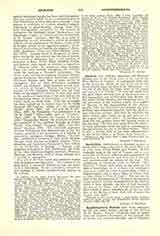

Apolytikion (apolutikion), a dismissal prayer or hymn said or sung at the end of the Greek Mass and at other times during Matins and Vespers. It was originally sung at the end of Vespers, and is very much like the Roman collect or postcommunion, inasmuch as it changes for each feast day of the year and commemorates the subject of the feast. The apolytikion of Christmas reads as follows: “Thy Nativity, O Christ, hath arisen on the world as the light of knowledge; for at it those who worshipped stars were taught by a star to adore Thee, O Sun of Righteousness, and to know Thee, O Orient from on high; Glory to Thee, O Lord”. The one for the feast of the Annunciation is: “Today is the crowning of our salvation and the manifestation of the Mystery which is from eternity; the Son of God becometh the Son of the Virgin, and Gabriel announceth the glad tidings of grace: wherefore let us cry out with him to the Mother of God; Hail, full of grace, the Lord is with thee!”
ANDREW J. SHIPMAN

